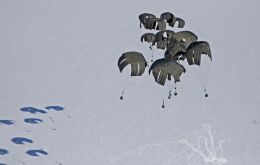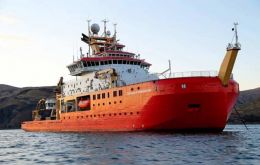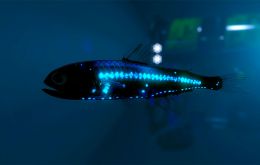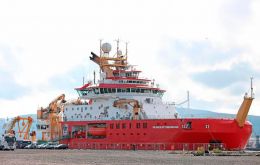MercoPress. South Atlantic News Agency
Tag: British Antarctic Survey (BAS)
-
Wednesday, February 1st 2023 - 10:07 UTC
RRS Sir David Attenborough begins its polar science trials in Antarctica

Falklands flagged UK’s new polar ship RRS Sir David Attenborough begins its polar science trials in Antarctica this week. A team of 30 national and international scientists, engineers and technical staff departed the Falkland Islands on Tuesday for almost two months of science capability trials – the first to test the ship’s science capabilities in deep polar waters.
-
Wednesday, January 25th 2023 - 09:28 UTC
Huge iceberg size of Greater London, breaks off from Brunt Ice Shelf, location of BAS Halley Research Station

A huge iceberg, some 1550 km², almost the size of Greater London, has broken off the 150m thick Brunt Ice Shelf. It calved after cracks that have been developing naturally over the last few years extended across the entire ice shelf, causing the new iceberg to break free. This occurred on Sunday 22 January between 19.00 and 20.00 UTC during a spring tide.
-
Wednesday, January 25th 2023 - 09:05 UTC
Operation Austral Endurance delivers fuel drums by parachute from Falklands' MPC to BAS in Antarctica

A Royal Air Force A400M Atlas aircraft has delivered vital fuel supplies to the British Antarctic Survey after taking off from the Falkland Islands Mount Pleasant Complex. The RAF said the range of the Atlas was extended by air-to-air refueling from a Royal Air Force Voyager, as part of Operation Austral Endurance..
-
Thursday, December 22nd 2022 - 10:14 UTC
EU and US satellites together with BAS calibrating ice at Weddell Sea

An ambitious flying campaign out of British Antarctic Survey’s Rothera Research Station over the Weddell Sea this month (December) aims to calibrate the data collected from two important satellites that monitor Antarctic sea ice.
-
Thursday, December 15th 2022 - 11:30 UTC
RRS Sir David Attenborough docks in Falklands: Saturday begins Antarctic round at Rothera Base

Falkland Islands RRS Sir David Attenborough has arrived to the Islands, and docked at East Cove, and is scheduled to leave for the Rothera Base on Saturday, beginning the Antarctica campaign.
-
Saturday, December 3rd 2022 - 07:21 UTC
Role of the Falklands in the development and success of British Antarctic Survey

The British Antarctic Survey (BAS) celebrated 60 years of scientific research in Antarctica as the UK’s national operator. BAS evolved from the Falkland Islands Dependency Survey (FIDS), following on the success of Operation Tabarin 1943/46 involving SS Fitzroy from the Falkland Islands. This week's event took place during the marking of Antarctica Day on December first.
-
Friday, November 18th 2022 - 09:12 UTC
Polar navigation to be revolutionized and more efficient with AI

Artificial Intelligence (AI) will enable ships navigating in polar ocean conditions to be more efficient using a new route planning tool created by British Antarctic Survey (BAS) researchers. The tool aims to reduce carbon emissions and optimize science.
-
Wednesday, October 5th 2022 - 13:55 UTC
Science tries to solve the mystery of lantern-fish, but for King penguins they are a delicious snack

A new study, led by British Antarctic Survey and the University of Bristol, provides the first evidence that a controversial evolutionary process may be responsible for lantern-fishes becoming one of the most diverse families of fish in the deep sea.
-
Thursday, September 1st 2022 - 14:13 UTC
British Antarctic Survey is releasing 25 years of aerogeophysical data

Over the past 50 years, the British Antarctic Survey (BAS) has been one of the significant acquirers of aero geophysical data over Antarctica, providing scientists with gravity, magnetic, and radar datasets that have been central to many studies of the past, present, and future evolution of the Antarctic Ice Sheet.
-
Tuesday, August 23rd 2022 - 09:54 UTC
RRS Attenborough calls at Belfast to pick up a new crew before further scientific research

After a long season in Antarctica, Falkland Islands' flagged exploration ship RRS Sir David Attenborough has docked in Belfast for the first time, to pick up new crew members ahead of carrying out further scientific studies around the UK coastline. The state of the art vessel is owned by the Natural Environment Research Council and operated by the British Antarctic Survey.
